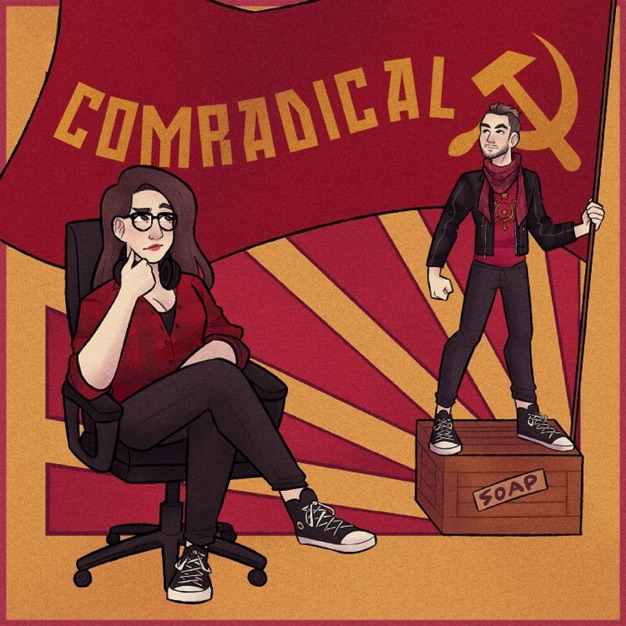
Proles of the Book Club
PBC
We are a group of comrades from the Proles Discord and these are our book club discussions.
- 1 hour 23 minutesFighting Fascism - Clara Zetkin
“Fascism is the strongest, most concentrated, and classic expression at this time of the world bourgeoisie’s general offensive. It is urgently necessary that it be brought down."
As fascism continues to become more violent and brazen internationally, the question of how to fight it becomes ever more urgent. In Fighting Fascism: How To Struggle and How To Win by Clara Zetkin the esteemed German Communist delivers her 1923 address to the Third Plenum of the Communist International which included her defintion of fascism, an analysis of its origins and what social, economic and political conditions led to the rise of fascism in Italy, tragically accurate and prescient warnings about the development of fascism in Germany, why the fight against fascism must be taken up by the entire proletariat and more. We also comment on fascism in the USA, discuss how to struggle against and overcome fascism and why we can never forget the devastating impact that fascism has had on the world.
Please note that this episode was recorded before the racist murder of George Floyd by members of the Minneapolis Police Department and it is for this reason that this and the subsequent uprisings and protests that followed aren't discussed in this episode.
This episode is part of our series on Marxist-feminists. As Mao and Thomas Sankara have said, “Women hold up the other half of the sky.” Red Book Club recognizes that including the voices of nonmen in our studies is not a niche activity, but is in fact an essential step in gaining the most comprehensive view of the material conditions of the past and present that we possibly can; therefore we’ve planned this series to amplify the ideas that nonmen have been bringing to the conversation for centuries. From Federici’s analysis of women as a means of primitive accumulation to Luxemburg’s essay of the benefits of revolution vs the impossibility of reform, each of these works confronts history and the movement for social change through the lens of the experiences of nonmen in society. Follow us on Twitter at @RBCpod or www.twitter.com/RBCpod and feel free to message us if you need links to companion resources or have any questions. You can also find us on our new site at www.rbcpod.wordpress.com where you can find ebook copies of the works that we're covering and more.
If you'd like to join or support the book club, you can find us on Patreon as Red Book Club: https://www.patreon.com/redbookclub including access to our Red Book Club discord server, early access to our episodes and more.
Thanks to @NunezKeenan for the intro theme; you can find more of their work here: http://tiny.cc/keenan
Thanks to the Craig bot for helping us to record via Discord!
And a special thanks to our patrons for their support in helping us to create the podcast.
Our logo was designed by Rob, you can find his work on Instagram @roobmmm
Outro music: Song of Choice - Peggy Seeger
25 July 2020, 11:46 pm - 54 minutes 8 secondsWitches, Witch-Hunting and Women (Part 2 - New Forms of Capital Accumulation and Witch-Hunting in Our Time) - Silvia Federici
"We are witnessing an escalation of violence against women, especially African-descendant and Native-American women, because 'globalisation' is a process of political recolonisation intended to give capital uncontested control over the world's natural wealth and human labour, and this cannot be achieved without attacking women, who are directly responsible for the reproduction of their communities."
In our second and final episode on Witches, Witch-Hunting and Women by Silvia Federici, our attention moves to the second part of the book, which begins with 'Globalisation, Capital Accumulation and Violence Against Women: An International and Historical Perspective' and concludes with 'Witch-Hunting, Globalisation and Feminist Solidarity in Africa Today'. These two brilliant essays lead us into discussions on how mental health systems have been oppressive to and dismissive of women and used to institutionalise, gaslight and punish them for their sexuality. Domestic violence and the punishment of women for leaving the house and working, how the witch-hunts legitimised women's subordination to men and gave control over their reproductive capacity to the state, the institutionalisation and normalisation of violence which started with primitive accumulation, why cops are domestic abusers and don't leave their violent behaviour behind when they finish work. We also tackle themes such as how abuse is weaponised against feminism, how debt crisis, structural adjustments and currency devaluation caused the witch-hunts, dowry murders in India and the resistance against them, Ghanaian witch camps and female solidarity, the capitalist and colonialist causes of the modern day witchhunts and the IMF, World Bank and the inherent violence of 'structural adjustment'.
This episode is part of our series on Marxist-feminists. As Mao and Thomas Sankara have said, “Women hold up the other half of the sky.” Red Book Club recognizes that including the voices of nonmen in our studies is not a niche activity, but is in fact an essential step in gaining the most comprehensive view of the material conditions of the past and present that we possibly can; therefore we’ve planned this series to amplify the ideas that nonmen have been bringing to the conversation for centuries. From Federici’s analysis of women as a means of primitive accumulation to Luxemburg’s essay of the benefits of revolution vs the impossibility of reform, each of these works confronts history and the movement for social change through the lens of the experiences of nonmen in society. Follow us on Twitter at @RBCpod and feel free to message us if you need links to companion resources or have any questions. You can also find us on our new site at www.rbcpod.wordpress.com where you can find ebook copies of the works that we're covering and more.
If you'd like to join or support the book club, you can find us on Patreon as Red Book Club: https://www.patreon.com/redbookclub including access to our Red Book Club discord server, early access to our episodes and more.
Thanks to @NunezKeenan for the intro theme; you can find more of their work here: http://tiny.cc/keenan
Thanks to the Craig bot for helping us to record via Discord!
And a special thanks to our patrons for their support in helping us to create the podcast.
Our logo was designed by Rob, you can find his work on Instagram @roobmmm
Outro music: 'Sibere Sibere' and 'Tora Rora Yambi' - Traditional Dagomba Women's Music From Ghana
26 May 2020, 11:39 am - 51 minutes 45 secondsWitches, Witch-Hunting and Women (Part 1 - Revisiting Capital Accumulation and the European Witch Hunt) - Silvia Federici
‘Every town has its witch, and every parish its trolls. We will keep them from life with the fire of joy.’
In the first of a two-part episode on 'Witches, Witch-Hunting and Women' by Silvia Federici, we discover how historical distortions of the witch-hunts lead to dangerous misunderstandings of women and their history in modern times and how women are not now gaining their rights for the first time, but regaining them after centuries of disenfranchisement and oppression.
Part one of the book ‘Revisiting Capital Accumulation and the European Witch Hunt’ consists of one song and four essays: ‘Midsommervisen - Vi Elsker Vort Land’, ‘Why Speak of the Witch Hunts Again?’, ‘Witch Hunts, Enclosures, and the Demise of Communal Property Relations’, ‘Witch-Hunting and the Fear of the Power of Women’ and ‘On the Meaning of ‘Gossip’’. In these insightful and thought-provoking pieces we discuss the Danish annual tradition of burning the effigy of a witch on ‘Sankt Hans Aften’ and how this practice makes light of one of the most violent time-periods that women have ever encountered; how the witch-hunts are finally being re-evaluated and recognised as the historical subjugation of women and as a means of accumulating profit off the labour of women; how restudying the witch hunts destroys the belief that capitalism was once a carrier of social progress; the destruction of the magical conception of the body and how female sexuality was exorcised of its subversive potential through the witch hunts; the links between witch hunts, McCarthyism and the war on terror; how a science of pain and torture was developed upon the bodies of women; and we study the example of the word ‘gossip’ to show how even our language has been changed in order sew discord in the place of women’s solidarity and to accommodate their oppression as well as asking ‘Do women really have it better now than ever?’
This episode is part of our series on Marxist-feminists. As Mao and Thomas Sankara have said, “Women hold up the other half of the sky.” Red Book Club recognizes that including the voices of nonmen in our studies is not a niche activity, but is in fact an essential step in gaining the most comprehensive view of the material conditions of the past and present that we possibly can; therefore we’ve planned this series to amplify the ideas that nonmen have been bringing to the conversation for centuries. From Federici’s analysis of women as a means of primitive accumulation to Luxemburg’s essay of the benefits of revolution vs the impossibility of reform, each of these works confronts history and the movement for social change through the lens of the experiences of nonmen in society. Follow us on Twitter at @RBCpod and feel free to message us if you need links to companion resources or have any questions. You can also find us on our new site at www.rbcpod.wordpress.com where you can find ebook copies of the works that we're covering and more.
If you'd like to join or support the book club, you can find us on Patreon as Red Book Club: https://www.patreon.com/redbookclub including access to our Red Book Club discord server, early access to our episodes and more.
Thanks to @NunezKeenan for the intro theme; you can find more of their work here: http://tiny.cc/keenan
Thanks to the Craig bot for helping us to record via Discord!
And a special thanks to our patrons for their support in helping us to create the podcast.
Our logo was designed by Rob, you can find his work on Instagram @roobmmm
Intro Music: Vi Elsker Vort Land (Midsommervisen) - Danmarks Radios Pigekor
Outro music: Gossiper Scandal Monger - Julie Coker
16 May 2020, 8:55 pm - 1 hour 35 minutesA Great Love (Part 2) - Alexandra Kollontai
This week we're once again collaborating with our comrades from The Tolerant Left podcast to bring the second of our two part episode covering 'A Great Love' by Alexandra Kollontai.
The second half of the book deals with an intensification of Semyon's abuse, his neglect of her needs, the belittling of Natasha's intelligence, how Senya's actions provoke self doubt and anxiety in her, Natasha's frustration and eventual disillusionment with their relationship and how after becoming jaded with Semyon's incorrigibility she courageously asserts her autonomy and finally breaks free. We also chat about 'crazy ex-girlfriends', how women are kept as toys and why drunkenness isn't an excuse for misogyny.
In our first time discussing a work of fiction we found no lack of important subject matter to be gleaned from the text. Considered by many to be a representation of a relationship between Inessa Armand and Vladimir Lenin, this essential and heart-breaking text gives us a deep insight into the physical and emotional reality of women revolutionaries before the October revolution and the harmful and misogynistic behaviour of men which remains unchanged to the present day.
This book, set in the world of revolutionaries exiled following the 1905 revolution, tells us the story of Natasha, an intelligent and dedicated party organiser, and her relationship with Semyon Semyonovich, a highly respected but deeply abusive official within the same party. Drawing from biographical experiences and those of her fellow comrades Kollontai paints a vivid picture of the profound pain and frustration which women suffered and suffer through in left-wing organising circles. From emotional abuse, dismissiveness and the downplaying of achievements to the ideas of transactional relationships, control in the institution of marriage and more.
This episode features our amazing comrades from The Tolerant Left podcast, an essential voice for non-men on the left https://twitter.com/tolerantleftpod
This episode is part of our series on Marxist-feminists. As Mao and Thomas Sankara have said, “Women hold up the other half of the sky.” Red Book Club recognizes that including the voices of nonmen in our studies is not a niche activity, but is in fact an essential step in gaining the most comprehensive view of the material conditions of the past and present that we possibly can; therefore we’ve planned this series to amplify the ideas that nonmen have been bringing to the conversation for centuries. From Federici’s analysis of women as a means of primitive accumulation to Luxemburg’s essay of the benefits of revolution vs the impossibility of reform, each of these works confronts history and the movement for social change through the lens of the experiences of nonmen in society. Follow us on Twitter at @RBCpod and feel free to message us if you need links to companion resources or have any questions. You can also find us on our new site at www.rbcpod.wordpress.com where you can find ebook copies of the works that we're covering and more.
If you'd like to join or support the book club, you can find us on Patreon as Red Book Club: https://www.patreon.com/redbookclub including access to our Red Book Club discord server, early access to our episodes and more.
Thanks to @NunezKeenan for the intro theme; you can find more of their work here: http://tiny.cc/keenan
Thanks to the Craig bot for helping us to record via Discord!
And a special thanks to our patrons for their support in helping us to create the podcast.
Our logo was designed by Rob, you can find his work on Instagram @roobmmm
Outro music: Tears Dry On Their Own - Amy Whinehouse
6 May 2020, 8:02 pm - 1 hour 22 minutesA Great Love (Part 1) - Alexandra Kollontai
“All she wanted was to stand between him and the world, relieve him of his worries, help him bear his cross.”
This week we're collaborating with our comrades from The Tolerant Left podcast to bring the first of two episodes covering 'A Great Love' by Alexandra Kollontai.
In our first time discussing a work of fiction we found no lack of important subject matter to be gleaned from the text. Considered by many to be a representation of a relationship between Inessa Armand and Vladimir Lenin, this essential and heart-breaking text gives us a deep insight into the physical and emotional reality of women revolutionaries before the October revolution and the harmful and misogynistic behaviour of men which remains unchanged to the present day.
This book, set in the world of revolutionaries exiled following the 1905 revolution, tells us the story of Natasha, an intelligent and dedicated party organiser, and her relationship with Semyon Semyonovich, a highly respected but deeply abusive official within the same party. Drawing from biographical experiences and those of her fellow comrades Kollontai paints a vivid picture of the profound pain and frustration which women suffered and suffer through in left-wing organising circles. From emotional abuse, dismissiveness and the downplaying of achievements to the ideas of transactional relationships, control in the institution of marriage and more.
Kollontai's moving text gives us space to investigate our own participants' experiences of abuse and left-wing misogyny as well offering a chance to create ways to overcome problems such as abuse on the left, how to deal with the work of historically problematic men and how we can acknowledge our faults in order to learn and grow.
This episode features our amazing comrades from The Tolerant Left podcast, an essential voice for non-men on the left https://twitter.com/tolerantleftpod
This episode is part of our series on Marxist-feminists. As Mao and Thomas Sankara have said, “Women hold up the other half of the sky.” Red Book Club recognizes that including the voices of nonmen in our studies is not a niche activity, but is in fact an essential step in gaining the most comprehensive view of the material conditions of the past and present that we possibly can; therefore we’ve planned this series to amplify the ideas that nonmen have been bringing to the conversation for centuries. From Federici’s analysis of women as a means of primitive accumulation to Luxemburg’s essay of the benefits of revolution vs the impossibility of reform, each of these works confronts history and the movement for social change through the lens of the experiences of nonmen in society. Follow us on Twitter at @RBCpod and feel free to message us if you need links to companion resources or have any questions. You can also find us on our new site at www.rbcpod.wordpress.com where you can find ebook copies of the works that we're covering and more.
If you'd like to join or support the book club, you can find us on Patreon as Red Book Club: https://www.patreon.com/redbookclub including access to our Red Book Club discord server, early access to our episodes and more.
Thanks to @NunezKeenan for the intro theme; you can find more of their work here: http://tiny.cc/keenan
Thanks to the Craig bot for helping us to record via Discord!
And a special thanks to our patrons for their support in helping us to create the podcast.
Our logo was designed by Rob, you can find his work on Instagram @roobmmm
Outro music: It's Not Me, It's You - Solution Hours
https://solutionhours.bandcamp.com/
26 April 2020, 7:23 pm - 49 minutes 21 secondsCaliban and the Witch (Chapter 5 - Colonisation and Christianisation) - Silvia Federici
In our fifth and final installment of our readings from Caliban and the Witch by Silvia Federici we focus on 'Chapter 5 - Colonisation and Christianisation: Caliban and Witches in the New World', in it we discuss the indigenous resistance of the Taki Unquy millenarian movement, the connection between colonisation throughout America and the witch-hunts in Europe, the introduction of prostitution, how Spaniards brought over the misogyny necessary to introduce a patriarchal capitalist order, our final thoughts on the piece and more.
This episode is part of our series on Marxist-feminists. As Mao and Thomas Sankara have said, “Women hold up the other half of the sky.” Red Book Club recognizes that including the voices of nonmen in our studies is not a niche activity, but is in fact an essential step in gaining the most comprehensive view of the material conditions of the past and present that we possibly can; therefore we’ve planned this series to amplify the ideas that nonmen have been bringing to the conversation for centuries. From Federici’s analysis of women as a means of primitive accumulation to Luxemburg’s essay of the benefits of revolution vs the impossibility of reform, each of these works confronts history and the movement for social change through the lens of the experiences of nonmen in society. Follow us on Twitter at @RBCpod and feel free to message us if you need links to companion resources or have any questions. You can also find us on our new site at www.rbcpod.wordpress.com where you can find ebook copies of the works that we're covering and more.
If you'd like to join or support the book club, you can find us on Patreon as Red Book Club: https://www.patreon.com/redbookclub including access to our Red Book Club discord server, early access to our episodes and more.
Thanks to @NunezKeenan for the intro theme; you can find more of their work here: http://tiny.cc/keenan
Thanks to the Craig bot for helping us to record via Discord!
And a special thanks to our patrons for their support in helping us to create the podcast.
Our logo was designed by Rob, you can find his work on Instagram @roobmmm
Outro music: Taki Onqoy II - Mercedes Sosa
18 April 2020, 3:21 pm - 52 minutes 58 secondsCaliban and the Witch (Chapter 4 - The Great Witch-Hunt in Europe) - Silvia Federici
As we delve deepter into Silvia Federici's 'Caliban and the Witch', we learn about the origins of the banning of reproductive sex and the demonisation of homosexuality, how women were pushed out of the workforce, the environment of acceptance around violence on the bodies of women, the attacks on women's intergenerational knowledge, elite magicians of the bourgeoisie, how class war and not enlightenment caused the end of the witch trials, links between Nazism and the witch-hunts and an overview of Malthusianism. Join us for our episode on chapter 4 of Caliban and the Witch - 'The Great Witch-Hunt in Europe' for insight into all these topics and more.
This episode is part of our series on Marxist-feminists. As Mao and Thomas Sankara have said, “Women hold up the other half of the sky.” Red Book Club recognizes that including the voices of nonmen in our studies is not a niche activity, but is in fact an essential step in gaining the most comprehensive view of the material conditions of the past and present that we possibly can; therefore we’ve planned this series to amplify the ideas that nonmen have been bringing to the conversation for centuries. From Federici’s analysis of women as a means of primitive accumulation to Luxemburg’s essay of the benefits of revolution vs the impossibility of reform, each of these works confronts history and the movement for social change through the lens of the experiences of nonmen in society. Follow us on Twitter at @RBCpod and feel free to message us if you need links to companion resources or have any questions. You can also find us on our new site at www.rbcpod.wordpress.com where you can find ebook copies of the works that we're covering and more.
If you'd like to join or support the book club, you can find us on Patreon as Red Book Club: https://www.patreon.com/redbookclub including access to our Red Book Club discord server, early access to our episodes and more.
Thanks to @NunezKeenan for the intro theme; you can find more of their work here: http://tiny.cc/keenan
Thanks to the Craig bot for helping us to record via Discord!
And a special thanks to our patrons for their support in helping us to create the podcast.
Our logo was designed by Rob, you can find his work on Instagram @roobmmm
Outro music: Witchcraft - The Lovely Eggs
11 April 2020, 1:52 pm - 1 hour 11 minutesMy Answer to an American Questionnaire - Pasha Angelina
“How did you become what you are, Pasha?”
Praskovya Angelina, affectionately known as Pasha Angelina, takes issue with an American Encyclopaedia's recognition of her as being a 'distinguished person'. In this autobiographical piece she lays out the story of her life from peasant farmer to deputy of the Supreme Soviet and takes us on a journey through collectivisation and the Soviet psyche during some of the most hopeful, and the most desperate times of modern human history.
Join us as we discuss Pasha Angelina's 'My Answer to an American Questionnaire', in which we learn the about the strength and humility of this Hero of Socialist Labour, contrast the mindsets of people living under socialism with those living under capitalism, discover the indomitable spirit of the Soviet people and learn how one of the most distinguished citizens of her era understood the concept fame.
This episode is part of our series on Marxist feminists. As Mao and Thomas Sankara said, “Women hold up the other half of the sky.” Red Book Club recognizes that including the voices of nonmen in our studies is not a niche activity, but is in fact an essential step in gaining the most comprehensive view of the material conditions of the past and present as we possibly can; so we’ve planned this series to amplify the ideas that nonmen have been bringing to the conversation for centuries. From Federici’s analysis of women as a means of primitive accumulation to Luxemburg’s essay of the benefits of revolution vs the impossibility of reform, each of these works confronts history and the movement for social change through the lens of the experiences of nonmen in society.
Follow us on Twitter at @RBCpod and feel free to message us if you need links to companion resources or have any questions.
You can also find us on our new site at www.rbcpod.wordpress.com where you can find ebook copies of the works that we're covering and more.
If you'd like to join or support the book club, you can find us on Patreon at Red Book Club: https://www.patreon.com/redbookclub where you can gain access to our Red Book Club server and more.
Thanks to @NunezKeenan for the intro theme; you can find more of their work here: http://tiny.cc/keenan
Thanks to the Craig bot for helping us to record via Discord!
Special thank you to each of our patrons, we greatly appreciate your support.
Outro music: Марш женских бригад - Женского хора и оркестра ГАБТ СССР
[March of the Women's Brigades - Female Choir and Orchestra of the Bolshoi Theatre of the USSR]
3 April 2020, 8:02 pm - 43 minutes 22 secondsCaliban and the Witch - Silvia Federici (Chapter 3 - The Great Caliban: The Struggle Against The Rebel Body)
How were we transformed from humans into machines? In this third installement of Silvia Federici's 'Caliban and the Witch' we discuss 'Chapter 3 - The Great Caliban: The Struggle Against The Rebel Body' and learn about the origins of the mechanisation of the workforce, the new social conceptualisation of the body, magical corpses, the philosophical battle between Descartes and Hobbes and the introduction of shame of the body.
This episode is part of our series on Marxist feminists. As Mao said, “Women hold up the other half of the sky.” Red Book Club recognizes that including the voices of nonmen in our studies is not a niche activity, but is in fact an essential step in gaining the most comprehensive view of the material conditions of the past and present as we possibly can; so we’ve planned this series to amplify the ideas that nonmen have been bringing to the conversation for centuries. From Federici’s analysis of women as a means of primitive accumulation to Luxemburg’s essay of the benefits of revolution vs the impossibility of reform, each of these works confronts history and the movement for social change through the lens of the experiences of nonmen in society. Follow us on Twitter at @RBCpod and feel free to message us if you need links to companion resources or have any questions. You can also find us on our new site at www.rbcpod.wordpress.com where you can find ebook copies of the works that we're covering and more.
If you'd like to join or support the book club, you can find us on Patreon as Red Book Club: https://www.patreon.com/redbookclub including access to our Red Book Club discord server and more.
Thanks to @NunezKeenan for the intro theme; you can find more of their work here: http://tiny.cc/keenan
Thanks to the Craig bot for helping us to record via Discord!
Outro music: Lover Nature - Terra Soror
https://terrasoror.bandcamp.com
27 March 2020, 10:00 pm - 2 hours 7 minutesCaliban and the Witch - Federici (Chapter 2 - The Accumulation of Labor and Degradation of Women)In this incredibly dense chapter we take a deep dive into topics such as women's bodily autonomy, economic abuse, the weight placed on women by austerity, women as the reproducers of the workforce, the criminalisation of poverty and many, many more. Join us as we dive back into Silvia Federici's game-changing work 'Caliban and the Witch' with 'Chapter 2 - The Accumulation of Labor and the Degradation of Women.' This episode is part of our series on Marxist feminists. As Mao said,“Women hold up the other half of the sky.”Red Book Club recognizes that including the voices of nonmen in our studies is not a niche activity, but is in fact an essential step in gaining the most comprehensive view of the material conditions of the past and present as we possibly can; so we’ve planned this series to amplify the ideas that nonmen have been bringing to the conversation for centuries. From Federici’s analysis of women as a means of primitive accumulation to Luxemburg’s essay of the benefits of revolution vs the impossibility of reform, each of these works confronts history and the movement for social change through the lens of the experiences of nonmen in society. Follow us on Twitter at @RBCpod and feel free to message us if you need links to companion resources or have any questions. You can also find us on our new site at www.rbcpod.wordpress.com where you can find ebook copies of the works that we're covering and more. If you'd like to join the book club, you can join our podcast's discord server Red Book Club: https://www.patreon.com/redbookclub including access to our Red Book Club server and more. Thanks to @NunezKeenan for the intro theme; you can find more of their work here: http://tiny.cc/keenan Thanks to the Craig bot for helping us to record via Discord! Outro music: Patriarcaeth - Gwenno17 March 2020, 12:39 am
- 50 minutes 25 secondsCommunism and the Family - Alexandra Kollontai'Capitalism has placed a crushing burden on women's shoulders.' In this piece by one of the towering figures of the working-women's movement, Kollontai shows how the old family unit is no longer useful and how communism provides the necessities to lessen the burden of women and we discuss how 100 years later working women are still staggered by the triple load of being a mother, housewife and worker as well as how the capitalist world is still playing catch up to the collossal social changes introduced in the Soviet Union. This episode is part of our series on Marxist feminists. As Thomas Sankara said, “Women hold up the other half of the sky.” Red Book Club recognizes that including the voices of nonmen in our studies is not a niche activity, but is in fact an essential step in gaining the most comprehensive view of the material conditions of the past and present as we possibly can; so we’ve planned this series to amplify the ideas that nonmen have been bringing to the conversation for centuries. From Federici’s analysis of women as a means of primitive accumulation to Luxemburg’s essay of the benefits of revolution vs the impossibility of reform, each of these works confronts history and the movement for social change through the lens of the experiences of nonmen in society. Follow us on Twitter at @RBCpod and feel free to message us if you need links to companion resources or have any questions. You can also find us on our new site at www.rbcpod.wordpress.com where you can find ebook copies of the works that we're covering and more. If you'd like to join the book club, you can support us through patreon at https://www.patreon.com/redbookclub membership includes access to our Red Book Club server and more. Thanks to @NunezKeenan for the intro theme; you can find more of their work here: http://tiny.cc/keenan Thanks to the Craig bot for helping us to record via Discord! Outro music: Working Class Woman - Barbara Dane5 March 2020, 8:47 pm
- More Episodes? Get the App
Your feedback is valuable to us. Should you encounter any bugs, glitches, lack of functionality or other problems, please email us on [email protected] or join Moon.FM Telegram Group where you can talk directly to the dev team who are happy to answer any queries.
 Marx Madness
Marx Madness
 A.K. 47 - Selections from the Works of Alexandra Kollontai
A.K. 47 - Selections from the Works of Alexandra Kollontai
 Comradical
Comradical
 Little Red School House
Little Red School House
 The Tolerant Left
The Tolerant Left